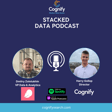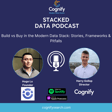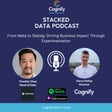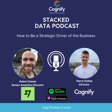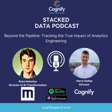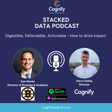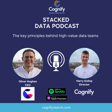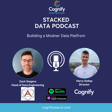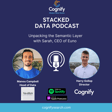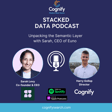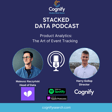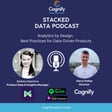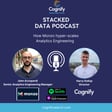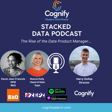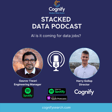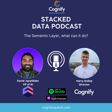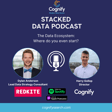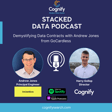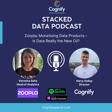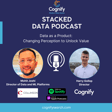Introduction to Stacked Podcast
00:00:02
Speaker
Hello and welcome to the Stacked podcast brought to you by Cognify, the recruitment partner for modern data teams hosted by me, Harry Golop. Stacked with incredible content from the most influential and successful data teams, interviewing industry experts who share their invaluable journeys, groundbreaking projects, and most importantly, their key learnings.
Challenges with Legacy Systems vs. Digital Natives
00:00:26
Speaker
So get ready to join us as we uncover the dynamic world of modern data.
00:00:34
Speaker
Hello, everyone. Welcome to another episode of the Stacked Data podcast. As the modern data stack matures, we're seeing more traditional organizations look to unlock the power of the modern data stack. These organizations face a whole new set of challenges compared to digital native organizations with huge amounts of legacy systems, silos, and data to navigate.
Matt Webb's Role in Cloud Migration
00:00:57
Speaker
Today, I'm joined by Matt Webb, the Head of Enterprise Data Management for UK Power Networks. For the last two years, Matt has been leading a migration to the cloud and Databricks as a pivotal part of UK Power Networks' mission to decarbonize the UK and achieve our net zero targets. Matt, welcome to the show. It's a pleasure to have you on. How are you doing today?
00:01:19
Speaker
Yeah, really well, thank you. Pleasure being here. Good. Well, I've obviously given a short intro to yourself, Matt, and what you're doing currently, but it'd be great to give the audience some context as to your background and how you got to where you are today. And I suppose a bit more meat on the bones as to your actual role.
00:01:37
Speaker
Yeah, sure. I don't think I've had a particularly conventional path in my career. I've discovered as time's gone on that that's increasingly common in data-centric roles. I've been with UK Power Networks for over 15 years now in a data-centric role for approximately eight. I'm talking about the current role and maybe with the overall responsibility for data across the corporate enterprise for the last two, two and a half years.
00:02:02
Speaker
And ultimately, I started with an engineering background, construction, building services engineering, ended up working in design-centric roles, and then got involved in business transformation.
Data as a Corporate Asset
00:02:10
Speaker
And that's where exposure to IT, digital technology, and ultimately data came in, started off in the asset management arena within the organization.
00:02:19
Speaker
And as the organization has matured from a digital data perspective, in parallel with the wider industry, there was a recognition that rather than just having a focus on a specific domain, such as asset, which is obviously core to an organization like us and that's intensive organization.
00:02:34
Speaker
We needed to recognise data itself as a corporate asset with the right governance controls, capability built around it to really leverage value, manage risk and make us as ready as possible for the transition that we're currently going through within the energy sector.
Parallels between Engineering and Data
00:02:50
Speaker
Amazing. I think, as you said, no one has a conventional route or into data. It's much more common now, obviously, data science degrees and people have that, but for people previously, it was very much a case of almost falling into data and
00:03:05
Speaker
I think your engineering background probably gives you quite a unique perspective. I always sort of see the similarities between engineering in the real world and then what is done within the cloud and the processes. It's all very, very similar. It's just one's done in code and the other is done in the physical world. So really interesting. Do you see any similarities between, I suppose, the engineering processes as to then what you're doing within the cloud and data?
00:03:30
Speaker
Absolutely. I think that's the key word, processes. That's what it's about. It's inputs, outputs, and value realisation at the end of the day. I guess this is the strength that I've discovered I've had in this arena and within my role is that ability to translate.
00:03:45
Speaker
very often the challenge that we face in developing or bringing in new skills, talent and capability to the organization is you're trying to find unicorns effectively where this mythical base that has the hardcore technical data oriented skills, but that domain knowledge of the industry or data landscape assistance and technology. And to a certain extent, the culture as well, you know, we're not easy organizations to operate in.
00:04:08
Speaker
utilities that is in terms of digitalisation and data because that's not our core focus, it's not our principle of objective and the thing that we're there to do ultimately as organisations and for distribution network operators like UK Para Networks, we are there to keep the lights on, to deliver electricity to people's premises and that's how we are driven as an organisation
00:04:29
Speaker
The concept of data is therefore slightly ethereal, very remote and secondary on most people's daily objectives. So when we're trying to bring people in, increasingly I see people from engineering backgrounds that are picking up skills.
Role of UK Power Networks in Energy Distribution
00:04:45
Speaker
through exposure, business intelligence tools, or coding through Python, and all these different things. And they're the ones who very often are the ones that are really, really strong and great assets to have within your team because they have that rare mix of skills. And it's not to say it doesn't work the other way around when you bring data-centric people in that learn the industry. But yeah, it's a challenge. And finding those people and being able to get the time under your belts to get them to that level of competence is quite a big investment.
00:05:12
Speaker
Yeah, yeah, for sure. I mean, look, I said in the opening part, obviously, that we're seeing from from our side, you know, the increased amount of traditional organizations, whether that be something like UK power networks, or the insurance spatial, these very established industries, finally getting over to the cloud, probably been on migrations for several years, and then looking to utilize the tech. So that's what we guys suppose we're going to uncover some of the
00:05:38
Speaker
some of the challenges that you guys face not being digitally native and how that transition to becoming more in that way in kind is. So you already gave a brief overview there, Matt, but who are UK power networks and what do you guys do?
Transition to a Dynamic Energy Ecosystem
00:05:54
Speaker
Yeah, so UK Power Networks is a distribution network and system operator covering the southeast of England. So effectively, three, what we call operational areas, the east of England, East Anglia, London, Greater London that is, and the southeast. And effectively, we own and operate the physical infrastructure that delivers electricity to the end customer. So energy is quite fragmented as an industry. You have central generation traditionally. You have big power stations.
00:06:23
Speaker
You have a national grid provider transmission network, which connects onto the distribution network, which UK products and our peer organisations are responsible for, connecting electricity down to the end customer. And then you have the retail arms, who you pay your bills to, wrapped around that. So there's already, from a legacy standpoint, quite a number of participants. However, the industry is going through quite a significant transition at the moment.
00:06:45
Speaker
where we are shifting as a DNO to a DSO, a distribution system operator, and what that is referring to is the active and proactive management of the network and operation of the network, whereas in the past effectively we designed, built, maintained, operated the network. The only thing we really did in an active sense was response defaults or planned shutdowns for maintenance and construction work.
00:07:07
Speaker
Whereas what we have now is a far more dynamic energy ecosystem with generation happening at every single level of the network, right the way down to the individual domestic customers. So we don't take panels on the roofs, battery storage, we've got the electrification of transport, electrification of heat, battery storage at scale, wind farms, solar farms.
00:07:26
Speaker
proliferating all across the geographic footprint, but also all levels of the network. And that means the way that power flows and the supply-demand characteristics are very, very different on the distribution network to what they were before. And we effectively have to have very good insight and predictability about what that's going to look like, a short time scale that would otherwise be the case, so that we can make sure we don't hit constraints or limitations in terms of capacity of the network. And, oddly, that comes down to
00:07:54
Speaker
increased remote monitoring and IoT type devices across the network itself, increased data flows off the back of that and the need for us to be able to process and act upon that and share it with others and communicate with those other participants across the industry.
Cloud Migration for Decarbonization
00:08:07
Speaker
So that's why data is so fundamentally important to the future success of the energy system to maximise its utilisation to contribute to decarbonisation and the net zero targets in which obviously energy has a key role in achieving.
00:08:21
Speaker
Amazing, amazing. So it seems like you've almost been forced to adopt a complete different way of working, a different approach to utilize data to better understand it because you've gone from being this very much sort of a maintenance from one source of energy and maintaining the system to now creating this almost spider web type infrastructure within the UK power networks of energy, which is being generated in different spaces.
00:08:49
Speaker
And it sounds like if you don't understand and aren't able to forecast these flows, then you're really unable to execute the right amount of power across the nation. Is that the case? Yeah, it's down to ensuring the integrity of the network and the reliability of supply.
00:09:07
Speaker
Obviously, we need to ensure that we do not end up with issues on the network that result in power cuts effectively. And it creates ensuring that we are not a blocker to decarbonization to net zero. And what that means is ensuring that we have a network that has sufficient capacity to allow you to put an application to connect your EV charge point and something we can facilitate very quickly without significant reinforcement or investment.
00:09:34
Speaker
However, we need to balance out the fact that what we describe as gold played the network. You can't oversize everything in the anticipation of future growth. You need to moderate that investment. So effectively, by having flexible, responsive services and capabilities, that allows us to maximize the utilization of the network to where you've got a low profile. If you imagine consumption of a 24-hour period, you have peaks at the start of the day and the end of the day.
Transition to Azure and Databricks
00:10:00
Speaker
the trough in the middle. So in terms of that maximum utilisation, it's for quite a short period of time. So by reducing consumption at those peak times and maximising at others through incentivised tariffs and other mechanisms, or by having contractual arrangements with generators
00:10:15
Speaker
to reduce or ramp up generation, that allows you to smooth that curve and maximise the physical asset on all sides. So that's the raison d'etre for us really in that context is to not be a block of decarbonisation and that's why that flexibility, scalability, that data-driven insight is fundamental.
00:10:34
Speaker
Amazing. So this whole sort of data transformation that you're on is all centred around enabling the decarbonisation and allowing you to achieve these net zero targets? Yeah, principally, yes. But of course, alongside the traditional role that we play as a network operator. Amazing. Amazing. So let's dive into this migration because it's obviously a lot of companies are going through it. And yeah, I'm sure we're going to have some great insights. So what technology are you utilising first off?
00:11:02
Speaker
So we are transitioning across to Azure. We are a single cloud, fairly conventional footprint that we've put in place for our data platform. So we are very Databricks centric. I think you mentioned Databricks earlier for our ETL or ELT processes that we've put in place. We have Synapse.
00:11:22
Speaker
available to us, but by and large, we're tending not to use it a huge amount at the moment, just because the nature of the use cases and requirements that we have just don't necessarily take that level of capability. So your SQL database is very much the mainstay. Block storage and all those components that anybody that's familiar with the Azure landscape would be familiar with, and increasingly we're looking at the streaming flows that we want to leverage into that as well, both pushing direct out from a dis-intelligence and automation point of view.
00:11:51
Speaker
but also storing historic telemetry related data from across the network. What that is replacing is effectively a very traditional MSBI on-prem landscape that is end of life. It hasn't had the level of love and care it's really acquired. Over the years, it's grown quite organically and it's
00:12:11
Speaker
Performing, it's functional, but it's far from optimal and does not allow us to leverage the types of capabilities that we want to and need to both now and in the future. So the transition to use your data platform is really, really key to realizing that
00:12:27
Speaker
aspiration of federating the access to a really highly curated, really reliable, central data repository for our business and also third party stakeholders.
Using Databricks for Data Insights
00:12:37
Speaker
So it's not just about the platform, it's about the governance framework that we have around that discoverability of the data through appropriate data cataloging tools.
00:12:45
Speaker
the quality management monitoring and intervention of that data, feeding that back across our enterprise systems, which themselves are quite complex and fragmented and siloed. And then when you get to the consumption level, there's been a huge amount of effort put into opening up our data for third party access and consumption. Something that we're mandated to do by our regulator off-gen because of that role we play within the broader energy ecosystems I was just describing. So the data platform is the
00:13:15
Speaker
central physical enabler really for that whole ecosystem.
00:13:20
Speaker
Amazing. So sort of the nervous system at the sort of center point of controlling everything that goes around the UK power networks and all the different systems that you touch upon. Yeah. So can you elaborate a bit more on sort of the around how far into the cloud migration and Databricks and how you are supposed how you're utilizing Databricks and actually achieving UK power networks mission of decarbonizing the UK?
00:13:48
Speaker
Yeah, so in terms of the timeline and progress, I would say coming over about 18 months in, so we started off with obviously establishing the platform itself, configuring and a huge amount of upscaling of the internal team and parallel was that, which obviously we wanted to make sure that we weren't incumbent on third party vendors to drive and deliver this capability for us.
00:14:07
Speaker
So that took up most of the first year and the action migration activities have been progressing pretty well actually off the back of that. We will be fully migrated by the end of quarter three this year. So we're in a fairly advanced state, lots of parallel threads.
00:14:24
Speaker
And it's not just a simple lick and shift. What we are doing moving across is really focusing in on what we require, the quality consistency of the legacy data, and going through that curation process and that quality process I mentioned before, so that we are straight off the bat, are protecting a really robust, resilient, highly accessible, highly consumable data resource.
00:14:46
Speaker
rather than just moving it from a physical on-prem environment to the cloud. So it would obviously just very, very quickly diminish any potential value. And equally with that is the opportunity to rationalize if we can reduce the footprint and the size of the data that we're moving across and obviously the consumption off the back of it, then there's obvious benefits to that as well in an OPEX-based model.
00:15:07
Speaker
In terms of the role of Databricks, it's always been a component of the platforms from day one, but what we have done is had a bit of a step change over the last couple of months in terms of really focusing your effort on that because you recognize the power of the
00:15:22
Speaker
solution really on a number of fronts. We have been fortunate we've been able to negotiate a long-term contract with Databricks which has a very heavy professional services component to it and we kicked that activity off last month and what that is doing is coming in the first instance and really reviewing what we've already put in place, how we got it configured optimally and maximizing the capabilities of
00:15:45
Speaker
of their technology, further progressing the upskilling, not just of my team as the center of excellence, but also building that capability across the organization. So it's starting to drive that federated capability across data citizens within the organization, allowing them to directly leverage it. And then beyond that, it's about how
Overcoming Legacy System Challenges
00:16:04
Speaker
we move from the ETL
00:16:07
Speaker
and building of the pipelines and creation of the enterprise data model within the Azure Data Platform off the back of that, how can we use Databricks to really drive new capabilities such as AI and machine learning activities, improve our business intelligence, both in terms of the pace at which we can gain insight, but also the quality of those insights.
00:16:30
Speaker
And the other thing I didn't mention is we're increasingly looking at how we can use the AI-based tooling within Databricks itself to drive the data quality rules which would otherwise have been quite manually intensive in the past. Essentially, you're almost there and now you're looking to leverage Databricks to allow you to have even more powerful, more advanced analytics as you move into the future, setting yourself up for success when it comes to more advanced analytics within the machine learning and data science space.
00:16:57
Speaker
Yeah, I think the best way to put it is people get very caught up and excited about clouds. And ultimately, in isolation, it's not that exciting. It's just dispersed infrastructure effectively, that if you use it properly has benefits around scalability, flexibility, security, and so on.
00:17:15
Speaker
But the value is quite limited in that direct sense. The value comes from how you put that data to work. So by taking the approach we are in eroding some of the legacy silos and barriers that exist around our data, whether it's from where it resides in an enterprise system or a data map that only one team has access to.
00:17:35
Speaker
by putting that together, having that inevitable definition of classification and discoverability for everybody, both internal and external stakeholders, and then through a robust but proportionate governance process that allows them to access what they need when they need to.
00:17:51
Speaker
and then have the self-sufficiency to leverage tools like Databricks or Power BI. Whatever solution you might want to put to work, you use the data as widely as possible, use that cognitive diversity across the organization beyond to really, really drive actual insights. And that's where the value comes from. You diminish the value of data by keeping it in a box somewhere that only a few people could look out and only look at it in a certain perspective. So you're opening it up to the whole business.
00:18:21
Speaker
Absolutely. And beyond, but in a controlled manner. Yes, keeping that governance. Okay, so I mean, how are we keen to dive into some of the challenges then, Matt? How do you think the challenges that you guys are facing with a lot of legacy systems in the industry that you're in, how do you feel that they differ from maybe the more digital native organizations that don't have some of these problems?
00:18:43
Speaker
Yeah, I think in reality, a lot of the changes are similar. It's the scale of them and how you have to navigate them is where the difference comes in. So within energy, we as a network operator have operated as an organization for decades. We have systems that are decades old. We have data that's decades old. What's expected and required of that data now is very, very different to when it was captured and created. So that inherently causes
00:19:10
Speaker
or create some challenges, which in some instances can be overcome, in others not. You're just limited by what exists and you can only fix forward. And a lot of people perceive that as a data quality problem. There'll always be that via while the data's rubbish and you'll hear that time and time again. The reality is the data might be perfectly adequate for purpose in the context of what it was intended for in the first instance.
00:19:33
Speaker
However, we're asking more of it now and it may not be fit for that purpose. So that challenge of how you augment your data, how can you enhance it, fill gaps, address true quality issues, integrate and join it with other data within the organization and potentially outside where you don't necessarily have any native keys or hooks to allow you to join it efficiently and effectively.
00:19:55
Speaker
They're the common barriers. And as I say, it's rare that things are insurmountable, but it slows you down massively. And it reduces that, or extends that time to value, which obviously isn't desirable. And that translates across in the organization. So they're kind of core to the challenges that we see. I think the other aspect is around expectation and understanding. The other aspect that comes with not being a digital or data-native organization
00:20:20
Speaker
is that there's a relatively low net of understanding about the realities of the data that we have, the systems we have, and the capabilities.
Maximizing Data Value through Diverse Perspectives
00:20:29
Speaker
And in many instances, to what extent we fail to fully leverage them, but also a lack of understanding about the true potential value. And this is where the power of opening up the data really comes in. And I mentioned before that cognitive diversity, I think it's a really important concept in this respect where
00:20:44
Speaker
When we deal with our data as a network operator, we are looking at it through a very, very specific lens and with a specific purpose in mind, i.e. to manage our assets principally or manage our staff or meet our customers' needs.
00:21:00
Speaker
However, what we are finding within that increasingly diverse energy ecosystem is that by pushing that data out, there are people out there who have a very different perspective, very, very different set of requirements, and the ability to put that data work in a way that we never envisaged just because it's so alien to us. And again, it increases that potential value. And that's not just the case for us as a network operator. The value might exist elsewhere. Decarbonization is a great example. It's something we need to contribute to.
00:21:29
Speaker
if we use the data in the sole way that we do internally, it's not necessarily allowing that broader benefit to be realized. So there's a real evolution, I guess, is the best way to do it in terms of the thinking, the maturity, the way to get around that risk aversion that typically exists within organizations like ours that need to be stable, that need to be steady, that need to make sure we keep those lights on. It doesn't come naturally and say, yeah, let's
00:21:56
Speaker
push all our data out and just give away our crown jewels and take that risk. So that's the other side that I think is probably slightly different for organizations like ours, rather than those that are, as you said, more data and digitally native. Amazing.
00:22:11
Speaker
I think another key area I wanted to touch upon was, I suppose, how are you and what projects are you contributing to this decarbonisation?
Projects Supporting Decarbonization
00:22:22
Speaker
Can we get into, I suppose, some of the more granular details of some of the work that your team are doing that are enabling the UK to hit these net zero targets?
00:22:32
Speaker
Yeah, I mean, as an organisation, we are very, very actively involved in this space. We have a very strong innovation culture and an internal capability focused solely on innovation-related projects, many of which have at least one foot in the camp of decarbonisation. But in terms of my own project portfolio, we are heavily supporting the DSA function, so I mentioned before that distribution system operation,
00:22:59
Speaker
For UK Power Networks, we have set up a separate part of the organization that provides that role. So they are independent from the legacy network operator organization. And ultimately, they are there to facilitate this interaction with third party stakeholders and maximize the utilization of the energy system. So they're the ones that are putting in new technology and have new data requirements with respect to short to medium term forecasting about
00:23:27
Speaker
supply and demand, whereas from a traditional DNA perspective, you're only really just long term growth where we're expecting there to be great demand, where do we need to build more network or bigger network. So we are supporting in facilitating that. There is then a lot of engagement with third party stakeholders. So local authorities are a great example of this. And basically, the DNO and DSL organisations have this interaction, but the DSO are interacting with the local authorities in terms of understanding what their energy planning requirements are.
00:23:57
Speaker
So, where do they plan development in the next 5, 10, 15 years? What are their energy targets and how do we contribute to that? And obviously, to help facilitate that, it requires this constant two-way dialogue, their understanding of our network, our development plans, any constraints or limitations we might have within a certain geography.
Fostering a Data-Driven Culture
00:24:19
Speaker
and then informing us of what's coming. So within our open data portal, the key platform that serves as the third-party access and consumption to our data, we, through our own engagement with local authorities, have set up a series of open data services where it's not just simply of sending out discrete data sets. We've packaged up a number of data sets under six different use cases that the local authorities have defined, such as eB ChargePoint infrastructure development,
00:24:47
Speaker
So it makes it as foolproof and intuitive for those organizations to go in, access and consume the data they want, and even be signposted to have a third-party data that we don't possess ourselves, so that they can answer those fundamental questions to help inform their optimal energy planning, obviously contributing to the organization's incentives or objectives. So yeah, it's really varied, but there's so many different projects from those hardcore technology through to more service-oriented ones that are pointing in that direction.
00:25:18
Speaker
Amazing. Sounds like there's plenty of opportunities to work on a plethora of different subjects. So I suppose the final few questions, Matt, is obviously very traditional organizations, digital transformations. I think one of the hardest parts and biggest challenges we see is that sort of change management, that culture management change of how do you get people to start adopting new processes, new technologies to start making the most of the infrastructure that you're building.
00:25:48
Speaker
So how do you guys foster a data-driven culture and what has been your strategies to that change management as you've been completing this migration? It's a very difficult thing and I think the reality is it's not something you achieve through a Big Bang approach. It's very progressive and incremental and I think there is a baseline growth or development of maturity and understanding and awareness if not competency within this space just as you've got
00:26:17
Speaker
younger people that are coming online within the organization who have grown up surrounded by technology and learning about contemporary techniques and coding. And they do engineering all those different things throughout their school and academic career. So that itself drives the difference to those people who have been in the organization 30, 40 years.
00:26:39
Speaker
when they started, it was a, you know, it was an analogue industry. And obviously, the transition that you see there is just an inherent part of the eel ocean of the organisation. But in terms of how we practically drive that cultural change, it starts, first of all,
00:26:55
Speaker
with just baseline literacy. So understanding the full range of roles and competencies that we have within the organization. You have a large operational workforce where data just isn't really much a feature in their mindset. They would interact and create data on a daily basis, but it's not going to be that apparent to them. It's just something that they do. And in that analogy, I've used several times in my time at UK Power Noexes,
00:27:20
Speaker
if you think about how people have a relationship with electricity, massively dependent on it, every single one of us, how often do we stop and really appreciate electricity? It's not generally until you flick a light switch and your light doesn't come on that all of a sudden you appreciate it or you're conscious of it. And data for the vast majority of people, in many organizations, but certainly in UK power networks, that's the case. Data is not appropriate or isn't a
00:27:44
Speaker
major factor in your day-to-day work life and activity until it's causing you a problem, until it's not there or until it's not good enough. So a big part of that literacy piece is to try and give those analogies and allow people to relate to it. But more importantly, to allow them to understand, one, to roll with data plays in their work activity.
00:28:06
Speaker
And two, the role that that individual plays in the quality consistency and the future legacy that's next within our data footprint that they create, whether it's through the generation of data themselves or updating something or whatever it may be. And just getting that baseline level across the workforce makes a big difference.
00:28:26
Speaker
There's then, of course, the fact that we want to grow this index federated capability across the organization. So that's where we get the more hardcore digital and data-based skills.
00:28:37
Speaker
that isn't just necessarily targeting those that already work in those areas, it's looking at individuals within teams and departments who have an interest or just want to have a dabble or really, really change direction in their careers.
Vision for Data-Centric Operations
00:28:48
Speaker
And we have a range of different training and support offerings from the digital apprenticeship program that we have, which takes advantage of the apprenticeship levy. We have
00:28:58
Speaker
Various partners who deliver a range of courses, the relationship with Databricks is a good example of where a big part of that professional services activity is providing upskilling within a certain toolset more broadly in terms of the AI and ML type learnings and also knowledge sharing across the different teams and areas we try to be quite collaborative and
00:29:19
Speaker
create forums where there's exchange of best practice between teams. And then the final one I'll call out is the executive engagement. And obviously, it's important for any organization that's going through the kind of transition that we are and that the industry is. There's at least an appreciation, understanding of how fundamental data is to the future success of the organization. One in terms of the risk it poses to success if we aren't on the front foot and we
00:29:46
Speaker
on making the most of contemporary practices, technologies, and building that capability. But equally, that value aspect that I spoke about, the fact that there is so much unrealized potential in the assets that we have, and building that understanding so that we have that support they're buying, we are able to invest, and that we drive the organization forward at large.
00:30:05
Speaker
many different strategies there. And I think, as you said at the beginning, it's that incremental, but you need all of them to be able to achieve it and move the dial. But the point at the end, I think, resonated most. You need that senior leadership buy-in to help.
00:30:22
Speaker
help everyone downstream of the organization to see that if you're, as a data team, the only one's waving the flag for data, it's very hard to make that change. Whereas if you have, you know, across the departments or sponsors or advocates for what you're doing and how it's impacting, then it makes that change so much more smoother.
00:30:44
Speaker
Thanks for sharing, Matt. Final question then before we go on to the quickfire round. What is the future for data at UK Power Networks? What do you envision looking ahead? Oh, so a tough question. What do I envisage? Big one. I hope it will be fully migrated onto the cloud. Another one. I want us to be in a position where data is just absolutely central to everyone's job and not a pain point.
00:31:12
Speaker
That's where I hope we can get to within a reasonable timescale, because there is this, what I describe as a gray economy within any organization, but certainly within ours, where you're trying to overcome those legacy data-related issues that I spoke about. What data have we got? Where is it? Is it good enough?
00:31:28
Speaker
what do I need to do to get it in the shape that I want to? And it just builds inefficiency across all processes, work activities, and also a lot of frustration. By doing what we're doing through our migration, through the data capability, through that cultural and behavioral transformation across the business, I hopefully get to a point where
00:31:48
Speaker
that time to value, that inertia that currently exists is a thing of the past and we can compete with those digitally native organizations that we talked about earlier. That would be the aspiration.
Interview Advice and Upskilling
00:31:59
Speaker
Nice, nice. So essentially getting yourself into that highly curated single source of truth, being able to really, really impact everyone without any friction. Yeah, absolutely. Nice, nice. Well, brilliant. Well, look, thanks for sharing it. It sounds like there's some amazing projects going on at UK Power Networks and their goal of decarbonisation. And that sounds like data is obviously playing a pivotal role in it as well. So thanks for sharing, Matt.
00:32:28
Speaker
Final bit of the podcast, this is a quick fire questions we asked all of our guests. So first one, Matt, what is your best piece of advice for someone in an interview? Oh, same, really corny aspect, but I think just be yourself, be relaxed. I think the best interviewees are those that just come in and have their personality and character on show. Yes, it's about competence and experience, but I think especially when you work in the type of role that I do.
00:32:57
Speaker
Most of my job is about translation and navigating around different people and parts of the business and understanding, listening and hopefully responding. And you do, you need to have a bit of personality and let that show in your interview. I think that always makes a big difference.
00:33:11
Speaker
Yeah, I couldn't agree more. I think, you know, data is still seen as a technical and it is a technical industry, but we also translate business value and that is all about being able to talk to the business, understand the business and
00:33:29
Speaker
as a leader like yourself, getting by for your projects, getting more budget. It's also all about sort of playing the politics, playing relationships and just being a nice person, I suppose, at the end of the day. So great, great advice. Final question, if you could recommend one resource to the audience to help them up skill, what would it be? One resource to help them up skill. I'm trying really hard not to say Google,
00:33:56
Speaker
It's actually VT. Yeah, absolutely. I don't think I can, because I don't think there is any one resource that's absolutely all-encompassing and reliable. I think you have to understand that the problem or question that you're trying to answer and recognize there's different points of reference.
00:34:19
Speaker
I like that one, Simon. I like that. I don't think you need to add anything else. We haven't had one like that. It's all about what you're trying to answer and finding the right solution for that. There's not a one-size-fits-all. Yeah, it feels like a little bit of a cop-out answer, but yeah, I think it's true. You're never going to have one place to go to that will give you a huge advantage.
00:34:40
Speaker
Yeah, and you should always validate what you have from from other sources. No, so I like it. Well, Matt, it's been an absolute pleasure. And yeah, great, fascinating to hear what you guys are doing. And yeah, how you're contributing to to net zero. So best of luck with the final bits of the migration. I really enjoyed the chat. And thanks for joining me. Thank you, Harry. Pleasure. Bye, everyone. See you next week.
00:35:05
Speaker
Well, that's it for this week. Thank you so, so much for tuning in. I really hope you've learned something. I know I have. The Stack podcast aims to share real journeys and lessons that empower you and the entire community. Together, we aim to unlock new perspectives and overcome challenges in the ever evolving landscape of modern data.
00:35:26
Speaker
Today's episode was brought to you by Cognify, the recruitment partner for modern data teams. If you've enjoyed today's episode, hit that follow button to stay updated with our latest releases. More importantly, if you believe this episode could benefit someone you know, please share it with them. We're always on the lookout for new guests who have inspiring stories and valuable lessons to share with our community.
00:35:49
Speaker
If you or someone you know fits that pill, please don't hesitate to reach out. I've been Harry Gollop from Cognify, your host and guide on this data-driven journey. Until next time, over and out.

